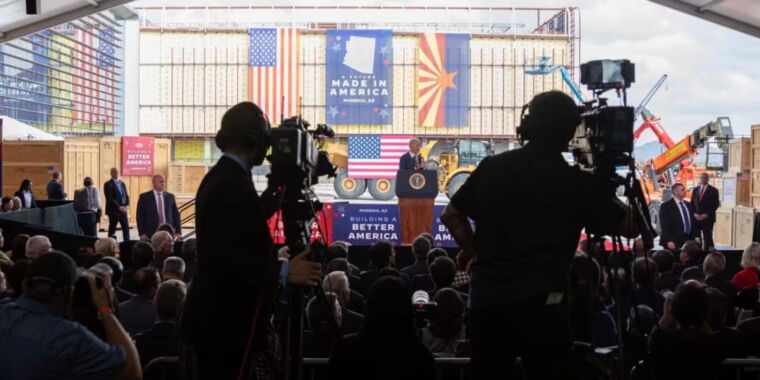Taiwan Semiconductor Manufacturing Company Invests in US Expansion
Taiwan Semiconductor Manufacturing Company (TSMC), the world’s largest chipmaker by sales, has recently announced plans to bring its latest technology to America. This strategic decision aligns with US President Joe Biden’s efforts to secure the critical tech supply chain. However, despite this move, the United States still falls short of achieving complete autonomy in producing the most sophisticated chips domestically.
TSMC faces the challenge of balancing its increased presence in the US while meeting the demands of key clients like Nvidia. Its business model, which has been instrumental in driving the global semiconductor industry for over three decades, must remain profitable amidst this expansion.
Challenges of Onshoring Chip Production
The planned $65 billion investments by TSMC in Arizona signal a construction race among major chipmakers like Samsung and Intel to establish operations in the US with substantial subsidies from Washington. However, producing chips for advanced applications such as artificial intelligence (AI) may still require facilities in Asia. This underscores the complexity involved in integrating different types of chips to enhance their performance and efficiency.
According to Myron Xie, an analyst at SemiAnalysis, “It’s really not that simple to onshore everything. Having the logic [chip] foundry in the US and then a bit of the packaging there is not enough.”
Future Technological Advancements
TSMC, known for manufacturing chips in highly complex fabrication plants, plans to commence the production of 2-nanometer chips in the US by 2028. This represents an upgrade from its previous strategy of operating each new fab in the US with technology one generation behind Taiwan. By 2030, TSMC aims to introduce a third plant using 2 nm or even more advanced technology.
The US government is investing heavily in TSMC’s expansion, providing $6.6 billion in grants and up to $5 billion in loans through the 2022 Chips and Science Act. This initiative aims to boost onshoring of cutting-edge chip production for the US, with the goal of manufacturing around 20 percent of the world’s most advanced chips by the end of the decade.
While the financial incentives from Washington play a role, TSMC’s primary motivation for enhancing its US presence is to align its strategy with the requirements of Nvidia and other AI chip vendors. These AI chips are driving significant demand across the global semiconductor industry.
TSMC plans to initiate volume production of 2 nm chips in Taiwan next year. Analysts note that the original timeline would have delayed the availability of less powerful 3 nm chips in the US till 2028, putting TSMC years behind the AI chip development cycle.
Image/Photo credit: source url





